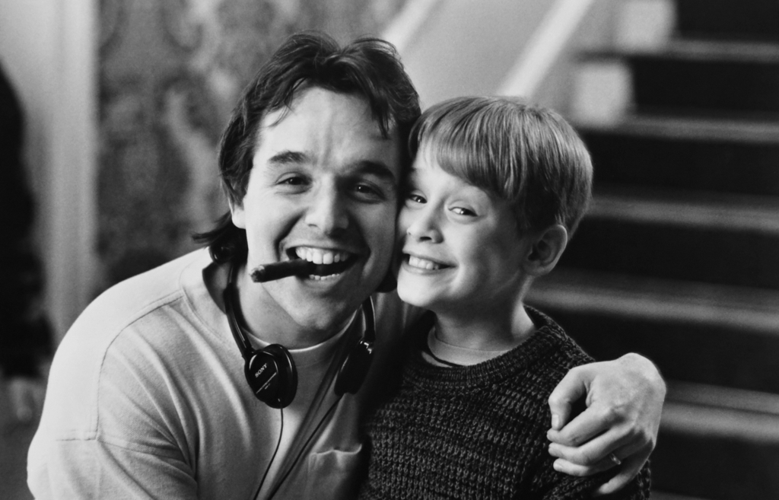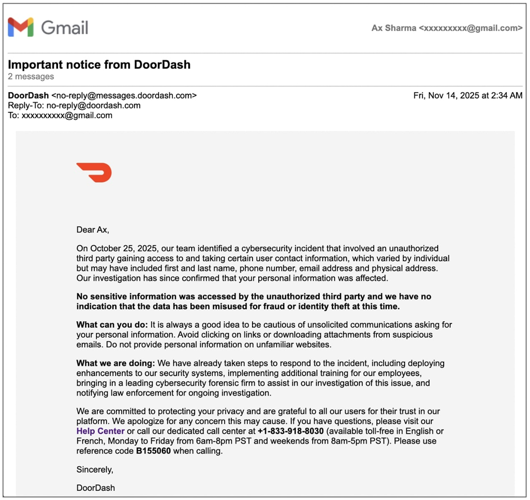Home Alone at 35 – Macaulay Culkin's Life & Legacy

Journey of a Child Star
'Home Alone' at 35: Macaulay Culkin's Journey from Child Star to Content Father
Three and a half decades after the Christmas classic first hit theaters, the film's once-tiny protagonist has grown into a bearded 45-year-old father of two young boys. Far from resenting his early fame, Culkin appears to have made peace with his iconic status as Kevin McCallister.
During a recent interview at London Hotel, Culkin was fresh from press duties for the post-apocalyptic series "Fallout," which he joined in its second season at his wife Brenda Song's suggestion. With Song away, Culkin was headed home for dad duty, playfully plotting to sneak his sons (ages 4 and under) some Happy Meals—a minor parental rebellion he hoped wouldn't be reported back to mom.
The former child star has embraced his "Home Alone" legacy, preparing for a 14-city tour featuring screenings of the 1990 film followed by personal storytelling sessions with audiences. This celebration comes as the holiday classic marks its 35th anniversary, having long since replaced "It's A Wonderful Life" as the quintessential Christmas movie for many viewers.
The film's journey to the screen wasn't without drama. Warner Bros. famously put the project in turnaround over a budget dispute with writer-producer John Hughes. Fox executive Joe Roth swooped in, keeping production on track in what became one of Hollywood's most profitable decisions. The original went on to gross approximately $475 million worldwide, with its sequel adding another $360 million.
Director Christopher Columbus recalls casting Culkin after seeing 500 other children, despite Hughes having written the part specifically for him following their work on "Uncle Buck." "He was just above and beyond a talent level; he was a movie star," Columbus remembered. "This kid was sitting in a room, and you're like, 'You're a movie star.'"
The film's success also hinged on the chemistry between Joe Pesci and Daniel Stern as the bumbling burglars. Columbus fought for Stern when the studio initially refused to pay for him, recognizing the perfect balance the actor brought opposite Pesci's more menacing presence.
Today, Columbus takes satisfaction in seeing Culkin as a content father, having successfully navigated the often-treacherous path from child stardom to well-adjusted adulthood—a journey as impressive as Kevin McCallister's defense of his family home all those Christmases ago.
Macaulay Culkin vividly recalls the swift studio switch for 'Home Alone' at a Chicago high school.
Warner Bros. posters vanished overnight, only to reappear branded by Fox shortly after.
Director Chris Columbus notes their frequent communication and upcoming Academy screening reunion.
Columbus admires Macaulay's remarkable adjustment into fatherhood, crediting it to overcoming childhood challenges.
He reflects on the difficult power dynamics with Macaulay's father, Kit, who leveraged his son's fame.
Despite this turbulent history, Macaulay broke the cycle, emerging as a dedicated parent unlike many child stars.
His brother Kieran, raised amid similar pressures, pursued acting with acclaimed success.
Both brothers share strong paternal instincts, evidenced in their heartfelt award speeches.
While Kieran earned an Emmy and Oscar, Macaulay carved an unconventional path—exploring music and selective acting roles.
Columbus firmly believes Macaulay possesses equal talent, awaiting the right role to showcase it.
"He’ll surprise everybody," Columbus predicts, emphasizing Macaulay’s career reflects his intentional choices.
Post-'Home Alone', Hughes handed creative control to Columbus, marking a pivotal shift in the film’s journey.
Reflecting on the legacy of a beloved holiday film, it’s remarkable how a single role can define an actor’s career and resonate across generations. Macaulay Culkin, now in his mid-forties, recalls the profound impact of his iconic portrayal of Kevin McCallister, a character who has become synonymous with Christmas cheer.
He shares that revisiting the film through special screenings has been a nostalgic experience, bringing together families in theaters to relive the laughter and holiday spirit. For Culkin, witnessing the audience’s reactions highlights how the movie continues to connect people, with parents introducing it to their children—passing down a festive tradition.
In personal moments, Culkin recounts how his children perceive him as Kevin, often unaware of his true identity, likening it to Clark Kent’s disguise—waiting patiently for the moment they realize the truth. He humorously anticipates that one day, the realization will hit them, perhaps spoiled by a peer, but until then, he’s content to keep the magic alive.
His memories from filming the movie are filled with amusing anecdotes, including a memorable incident on set where co-star Joe Pesci accidentally bit his finger during a rehearsal. Despite the pain, Culkin kept quiet, understanding the intensity of filming and the toughness of his co-star. Such stories showcase the behind-the-scenes camaraderie and the genuine moments that contributed to the film’s enduring charm.
As Culkin reflects on his journey—from childhood stardom to maintaining a sense of normalcy—he emphasizes the importance of grounding himself amidst Hollywood’s whirlwind. The film’s anniversary serves as a reminder of its timeless appeal and Culkin’s own resilience, illustrating how a young actor’s talent can leave an indelible mark on holiday traditions worldwide.
Reflecting on the 'Home Alone' Legacy: Macaulay Culkin's Journey to Self-Discovery
Finding peace with childhood fame isn't easy, but for Macaulay Culkin, the 35th anniversary of 'Home Alone' marks a significant milestone in his relationship with his past. Unlike many child stars who actively distance themselves from early success, Culkin describes his journey as more nuanced.
"I wouldn't describe it as running away from my past—it was more about discovering who I wanted to be beyond that role," Culkin explains. "I've stepped away from Hollywood countless times throughout my life. My early success was both a blessing and a burden, but over the last decade, I've come to accept it as an integral part of my story."
Similar to Jodie Foster, who took time away to attend Yale after early success in films like 'Taxi Driver,' Culkin needed space to develop his identity outside the spotlight. After 'Richie Rich,' he disappeared from screens for nearly eight years.
"I needed that time away to figure things out," he reflects. "Acting found me—I didn't seek it out. There was probably a reason for that, but I couldn't see it until I stepped back."
The early years of Culkin's career were complicated by family dynamics, particularly his father's controversial management. "When you're young, you don't know any different. It's only with hindsight that you realize how unusual your experience was," he says. "When I started saying I needed a break, nobody listened because the money was flowing. It was a 'gravy train with biscuit wheels,' as they say."
The joy had vanished from acting—precisely when childhood should be most carefree. Once Culkin gained personal autonomy, he made the decision to walk away completely, unsure if he'd ever return.
"I had financial security, so I could explore any path. I could have become an engineer or accountant—nothing was beneath me. But eventually I realized that perhaps I was meant to act. How fortunate is someone to discover their calling, especially when it finds them rather than the other way around?"
Even as a young performer in 'Uncle Buck,' Culkin recognized his natural talent. "I could feel when an audience was engaged with me. If I said something meant to get a laugh, and it did—I knew I was doing something right. It came naturally."
Regarding his work with directors like John Hughes and Chris Columbus, Culkin notes different approaches to his performances. "There wasn't much improvisation on 'Home Alone.' Chris had a specific vision and would often give me line readings. John Hughes was more flexible, encouraging me to be spontaneous since my character in 'Uncle Buck' was meant to be zany."
Culkin's remarkable journey from child star to self-assured adult demonstrates that sometimes, as he puts it, "you have to lose it to find it."
Macaulay Culkin's Early Years
Growing up in the bustling neighborhoods of Manhattan, Macaulay Culkin was often recognized not just for his youthful charm but for his early immersion into the world of entertainment. From a young age, he displayed a natural instinct for comedy, often improvising with props like aftershave without much forethought, mimicking the slapstick antics of Looney Tunes characters. His fascination with classic cartoons helped shape his comedic timing, with moments reminiscent of the Road Runner and Wile E. Coyote—standing mid-air just before falling, exaggerated expressions, and playful gestures that felt instinctive rather than rehearsed.
Culkin recalls that sometimes his performances were precisely directed, but he also shares a valuable trick used by experienced directors: the ‘butter trick.’ Instead of praising a performance outright, they would keep filming, encouraging spontaneity. For example, during a rehearsal for a scene on "Studio 60 on the Sunset Strip," the cast laughed when Culkin requested butter in a Thanksgiving scene. Yet, during the actual take, the laughter vanished because the director’s subtle technique had shifted the focus from the joke to the natural flow of the scene. Essentially, praise can sometimes hinder genuine performance; instead, persistent encouragement—asking for the ‘butter’—elicits authentic acting.
The rapid rise to fame after his initial films was overwhelming for a boy just entering double digits. Culkin’s early environment was already saturated with acting—he was known as the “actor kid” in his neighborhood, involved in theater, movies, and even ballet. He describes his journey as a classic hero’s adventure: starting with small theater roles, progressing through commercials, then small films, and eventually landing a leading role in a major production. This progression felt natural to him at the time, though looking back, he recognizes how extraordinary the experience was. For him, it was simply the way things unfolded—an unintentional yet inevitable path for a young performer.
As he matured, Culkin gained perspective on just how unusual his childhood was. The fame and attention often left him yearning for a sense of normalcy and peer connection. Being constantly surrounded by adults and working with fellow actors meant he rarely experienced typical childhood friendships. He felt the desire to simply go to school, to be a regular kid, and to grow up among his peers. His friends often teased him, calling him “11 going on 40,” a reflection of his maturity and the weight of his early experiences. Once he decided to step away from acting, he made a firm choice: he wanted a different life, one grounded in normality and genuine social connections.
Dealing with the challenges of leaving the acting world was also influenced by his family circumstances. During his parents’ separation, Culkin decided to take control of his future, asserting that he was done with showbiz. He recalls raising his hand and firmly stating, “I’m finished,” emphasizing his desire to focus on school and ordinary life. With his brother Kit’s reputation already strained, it became easier for Culkin to detach, feeling liberated from the pressures and complexities of fame. Today, he values that decision, cherishing the simple joys of childhood and friendship that he longed for during his early years in the spotlight.
Early Career Reflections
Reflecting on his early career, Macaulay Culkin recalls working alongside young actors like Elijah Wood and Anna Chlumsky, noting the differences in their personalities and approaches. While he describes himself as more relaxed and street-smart, the others carried a more earnest, calculated demeanor. Culkin shares a humorous memory of sharing a trailer with Anna during filming in Orlando, where her habit of pouring sour milk down the drain irritated him intensely—a petty annoyance from a ten-year-old's perspective.
He emphasizes that adult actors often display more dramatic reactions over minor issues, but his own experience was characterized by quiet frustration rather than tantrums. Culkin views himself as a different 'animal' within the acting world, comparing people to hooved creatures like deer or zebras—each unique despite similar features.
Discussing the challenges of growing up in the spotlight, Culkin admits he struggled with social interactions due to a lack of emotional vocabulary, often feeling like a "baby tomato" trying to catch up to his peers. He developed clever strategies to navigate social situations, such as ending conversations early or asserting boundaries to feel secure. For him, safety—both emotional and physical—is fundamental, and understanding feelings like happiness, anger, sadness, and fear helps him maintain control over interactions.
He sets clear personal rules to protect his privacy, such as avoiding unnecessary physical contact or private encounters in sensitive settings. Culkin explains that establishing these boundaries was a gradual process, taking decades for him to feel comfortable asserting them fully, but ultimately crucial for his mental well-being.
Turning to his adult life, Culkin reflects on the difference between his growth trajectory and that of many peers, who often find their career and personal fulfillment in their 40s. He admits that, in his late teens, he occasionally wished he could erase the baggage from his childhood fame, but overall, he values his uniqueness. Embracing his individuality, he likens himself to a unicorn—a hooved animal distinct from others—proud of his differences.
Regarding his relationship with his father, Culkin reveals a strained history. Once a protector, his father’s behavior changed over time, possibly influenced by the power and fame that surrounded him. Many in Hollywood have remarked on the shift from seeing Macaulay as a sweet kid to disapproving of his father’s actions. Culkin confirms that his father has distanced himself from his children, with none of his siblings maintaining a relationship. He emphasizes that his priority is safeguarding his own children from any negative influence or past sins, choosing to focus on his family’s well-being rather than reconciliation.
Personal Reflections and Legacy
Reflecting on past conflicts, I realize that certain behaviors were simply unacceptable in my view, which led to some tough decisions. When someone crossed a line, I felt it necessary to distance myself, knowing that they might end up alone, and frankly, I believed they deserved it. I didn't feel compelled to explain myself; they were aware of the actions that caused the rift. Sometimes, though, the individual in question might not fully acknowledge their misdeeds, especially considering their tendency to distort or deny reality. I remember an incident from over three decades ago—an argument or a heated exchange in front of friends—that left a lasting impression. I tolerated a lot, swallowing the discomfort, but that particular event stuck with me.
Later, when I was colder toward this person, they questioned me, unaware or perhaps in denial about the cause. I told them it was because they humiliated me publicly. They insisted it never happened, even though it clearly did. Their mind works in strange ways—twisting memories or blocking out certain truths to avoid facing reality. This pattern is part of who they are, and no amount of therapy or discussion seems to change that. It’s like trying to wash away an ink stain that’s permanently set.
When considering how much this individual’s behavior affected me, I believe the impact was limited. The community or those around us could see who was truly responsible—him. They understood when he was trying to manipulate or grab power. For instance, at a major studio, I doubt anyone truly believed I was pulling strings behind the scenes to influence decisions about my career, especially at such a young age. People are perceptive; they saw me as a talented kid with boundless energy, not someone orchestrating industry moves.
Over the years, I’ve encountered people who were burned or hurt by him, but they didn’t blame me. They recognized that I was just a child at the time, doing my job and being professional. I’ve always approached my craft with integrity, never playing the diva, just focusing on doing good work. It’s innate—born into it, as natural as a fish swimming.
In my own family, I believe I’ve broken some damaging cycles. I cherish my children profoundly and strive to give them unconditional love. For example, during my child’s school recital, he was supposed to play a small role—the bug trying to retrieve an egg. When he froze on stage and ran off crying, I immediately went to him and told him how proud I was. Getting up there was brave enough; I acknowledged his fear and praised his effort. That moment, I wanted him to know that regardless of the outcome, I was proud of him for facing his fears. It’s about unconditional acceptance—no matter if he’s the bug or not, he is loved and supported. That’s the core of my parenting philosophy.
When reflecting on the late John Candy, Macaulay Culkin shares touching memories of their time working together on beloved films like "Home Alone" and "Uncle Buck."
"He was very sweet," Culkin recalls with evident fondness. "He had a fatherly kind of vibe."
What distinguished Candy from others in Hollywood was his genuine interest in the young actor's wellbeing. "When he would ask me how I was doing, he actually was asking how I was doing," Culkin emphasizes, highlighting the authentic care Candy showed him on set.
The actor, now a father himself, expresses a poignant regret: "He always took care of me. I really wish... he could have been around to see my kids."
This heartfelt sentiment comes following the release of a new documentary celebrating John Candy's life and legacy, which features significant commentary from Culkin about their professional relationship and personal connection.
Their collaborations, particularly in films directed by John Hughes, created cinematic moments that continue to resonate with audiences decades later.
What are the Harry Potter Movies about and Where to Watch
What are the Harry Potter Movies about and Where to Watch? The Harry Potter film series chronicles the magical adventures of a young wizard who discovers his extraordinary heritage while attending Hogwarts School of Witchcraft and Wizardry, forming friendships and confronting the evil Lord Voldemort. For those wondering where to watch harry potter, the complete collection is available on streaming services like HBO Max and Peacock, though availability varies by region, or you can rent/purchase the films through digital platforms such as Amazon Prime Video, Apple TV, and Google Play.
Why Choose SafeShell as Your Netflix VPN?
If you're looking to access region-restricted Netflix content like the Harry Potter film series, the SafeShell VPN is an excellent solution to consider. This premium service bypasses geographical blocks effectively, ensuring you can stream your favorite magical adventures without frustrating location errors.
SafeShell VPN delivers outstanding benefits for Netflix users, starting with its ultra-fast servers optimized specifically for high-definition streaming that eliminate buffering completely. You can simultaneously connect up to five different devices—whether smartphones, tablets, or smart TVs—while its specialized tools unlock diverse regional libraries in one seamless session. Military-grade encryption and zero-logs policy guarantee ironclad privacy during streaming, and you can confidently test all features risk-free through their generous free trial before subscribing.
A Step-by-Step Guide to Watch Harry Potter with SafeShell VPN
Are you tired of geographical restrictions preventing you from enjoying the magical world of Harry Potter? With SafeShell VPN, you can easily bypass these limitations and immerse yourself in the wizarding adventures from anywhere. The process is straightforward and requires minimal technical knowledge, making it accessible for all Harry Potter enthusiasts.
First, head to the SafeShell VPN website to subscribe to a suitable plan that matches your requirements. After completing your subscription, download the application that's compatible with your device—whether you're using Windows, macOS, iOS, or Android. Installation is quick and user-friendly, allowing you to set up the VPN in minutes without any complicated configuration.
Once installed, launch SafeShell VPN and log into your account. For the optimal streaming experience, select APP mode which is specifically optimized for watching content. Next, browse through the server list and connect to a location where Harry Potter is available in the streaming library (typically the US or UK servers work best). With your connection secured, simply open your preferred streaming platform, search for Harry Potter, and enjoy all eight films of the beloved franchise without interruption or geo-restrictions.






